-
 Bitcoin
Bitcoin $82,532.5653
-0.47% -
 Ethereum
Ethereum $1,824.2400
-0.22% -
 Tether USDt
Tether USDt $1.0002
0.04% -
 XRP
XRP $2.0891
-2.87% -
 BNB
BNB $598.7668
-1.02% -
 Solana
Solana $125.5207
0.59% -
 USDC
USDC $0.9999
-0.03% -
 Dogecoin
Dogecoin $0.1644
-3.47% -
 Cardano
Cardano $0.6468
-4.11% -
 TRON
TRON $0.2341
1.48% -
 Toncoin
Toncoin $3.9443
3.93% -
 Chainlink
Chainlink $13.3725
-2.17% -
 UNUS SED LEO
UNUS SED LEO $9.1022
-5.82% -
 Stellar
Stellar $0.2658
-0.94% -
 Avalanche
Avalanche $18.7494
-2.83% -
 Shiba Inu
Shiba Inu $0.0...01225
-3.10% -
 Sui
Sui $2.2404
-5.15% -
 Hedera
Hedera $0.1615
-5.38% -
 Polkadot
Polkadot $4.0239
-1.65% -
 Litecoin
Litecoin $82.5262
-3.94% -
 MANTRA
MANTRA $6.2971
-0.12% -
 Bitcoin Cash
Bitcoin Cash $300.5206
-2.01% -
 Dai
Dai $0.9999
-0.01% -
 Bitget Token
Bitget Token $4.4612
-3.72% -
 Ethena USDe
Ethena USDe $1.0000
0.00% -
 Pi
Pi $0.7041
-8.37% -
 Hyperliquid
Hyperliquid $12.6570
0.20% -
 Monero
Monero $216.6236
0.33% -
 Uniswap
Uniswap $5.9290
-0.81% -
 Aptos
Aptos $5.3023
0.05%
How to send cryptocurrencies with Trust Wallet?
To send crypto via Trust Wallet, select your cryptocurrency, enter the recipient's address carefully, specify the amount, review details, and confirm the transaction.
Mar 27, 2025 at 12:07 pm
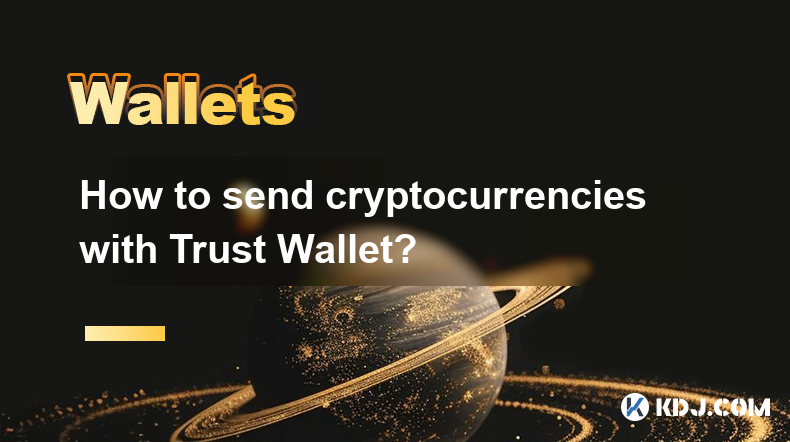
Understanding Trust Wallet's Sending Process
Trust Wallet, a popular mobile cryptocurrency wallet, offers a relatively straightforward process for sending various cryptocurrencies. Before initiating a transfer, ensure you have the recipient's wallet address and sufficient funds in your Trust Wallet balance, including any necessary network fees. Incorrectly entering the recipient's address can lead to irreversible loss of funds. Double-check everything before confirming the transaction. Remember that transaction fees vary depending on the network congestion and the chosen cryptocurrency.
Step-by-Step Guide to Sending Crypto
Sending crypto through Trust Wallet involves several key steps. Let's break down the process:
Step 1: Open the Trust Wallet App and Select Your Cryptocurrency: Launch the Trust Wallet application on your mobile device and navigate to your cryptocurrency holdings. Select the specific cryptocurrency you wish to send.
Step 2: Tap the "Send" Button: Once you've selected your cryptocurrency, locate and tap the "Send" button. This will initiate the sending process.
Step 3: Enter the Recipient's Wallet Address: Carefully enter the recipient's wallet address. This is crucial; any errors here could result in the loss of your funds. Double and triple-check the address before proceeding.
Step 4: Specify the Amount: Input the amount of cryptocurrency you intend to send. Be mindful of any minimum transaction amounts set by the network. You'll also see a preview of the transaction fees.
Step 5: Review the Transaction Details: Before finalizing the transaction, thoroughly review all the details: the recipient's address, the amount being sent, and the associated network fees.
Step 6: Confirm the Transaction: Once you are completely satisfied with all the details, tap the "Confirm" button to finalize the transaction. This will initiate the transfer of your cryptocurrency.
Step 7: Monitor the Transaction: After confirmation, the transaction will be broadcast to the blockchain network. You can monitor its progress within the Trust Wallet app or using a blockchain explorer for the specific cryptocurrency.
Understanding Network Fees (Gas Fees)
Network fees, often referred to as gas fees, are essential to understand when sending cryptocurrencies. These fees compensate miners or validators for processing and verifying your transaction on the blockchain. The amount of the fee varies based on several factors, including network congestion and the chosen cryptocurrency. Higher network congestion typically leads to higher fees. These fees are usually displayed before you confirm the transaction. Always check the fee before confirming.
Sending Different Cryptocurrencies
The process for sending different cryptocurrencies through Trust Wallet remains largely consistent. However, there might be slight variations in the user interface depending on the specific coin or token. Always double-check the specific instructions for each cryptocurrency you are sending. Some cryptocurrencies might have higher minimum transaction amounts or specific network requirements.
Troubleshooting Common Issues
Occasionally, you might encounter issues while sending cryptocurrencies. Here are some common problems and their potential solutions:
Incorrect Wallet Address: This is the most common mistake. Double-check the recipient's address meticulously. Sending to the wrong address results in irreversible loss of funds.
Insufficient Funds: Ensure you have enough funds in your wallet to cover both the amount you're sending and the associated network fees.
Network Congestion: High network congestion can lead to increased transaction fees and slower confirmation times. Consider waiting for periods of lower network activity or adjusting the gas fee if possible.
Transaction Failure: If a transaction fails, check the error message provided by Trust Wallet. This message usually indicates the reason for failure, such as insufficient funds or an invalid address.
Security Best Practices
Security is paramount when handling cryptocurrencies. Here are some best practices to follow:
Strong Password: Use a strong and unique password for your Trust Wallet account.
Two-Factor Authentication (2FA): Enable 2FA for added security.
Regular Updates: Keep your Trust Wallet app updated to the latest version to benefit from security patches and improvements.
Beware of Scams: Be cautious of phishing attempts or fraudulent websites claiming to be associated with Trust Wallet.
Frequently Asked Questions
Q: What happens if I send crypto to the wrong address?
A: Sending cryptocurrency to the wrong address is irreversible. Your funds will be lost, and there is no way to recover them. Always double-check the recipient's address before confirming the transaction.
Q: How long does it take to send crypto using Trust Wallet?
A: The transaction time varies depending on the cryptocurrency and network congestion. Some transactions are confirmed within minutes, while others might take longer.
Q: What are network fees, and why are they necessary?
A: Network fees, or gas fees, are payments to miners or validators who process and verify transactions on the blockchain. They are necessary to incentivize these network participants and ensure the smooth functioning of the blockchain.
Q: Can I send different cryptocurrencies in a single transaction?
A: No, you cannot send different cryptocurrencies in a single transaction through Trust Wallet. Each cryptocurrency requires a separate transaction.
Q: What should I do if my transaction fails?
A: If your transaction fails, check the error message provided by Trust Wallet for clues. You might need to adjust the gas fee or check your balance. If the problem persists, contact Trust Wallet support.
Q: Is Trust Wallet safe?
A: Trust Wallet employs various security measures to protect user funds. However, like any digital wallet, it's crucial to follow best security practices, including using a strong password and enabling 2FA. Remember that you are responsible for securing your own private keys.
Q: What if I forget my Trust Wallet password?
A: If you forget your password, you will need to recover your wallet using your recovery phrase (seed phrase). This phrase is crucial for accessing your funds; keep it safe and secure. Never share your recovery phrase with anyone.
Q: Can I send NFTs through Trust Wallet?
A: Yes, Trust Wallet supports the sending of NFTs, but the process may differ slightly from sending other cryptocurrencies. Check the specific instructions for your NFT and the supported blockchain. Remember to double-check the recipient address.
Disclaimer:info@kdj.com
The information provided is not trading advice. kdj.com does not assume any responsibility for any investments made based on the information provided in this article. Cryptocurrencies are highly volatile and it is highly recommended that you invest with caution after thorough research!
If you believe that the content used on this website infringes your copyright, please contact us immediately (info@kdj.com) and we will delete it promptly.
- The Crypto World Has Many Choices for Investors Who Want Safe Gains
- 2025-03-31 21:20:13
- Dogecoin (DOGE) Has a Turbulent Start to March, But Technical Indicators Hint at a Potential Bullish Turnaround
- 2025-03-31 21:20:13
- Dogecoin (DOGE) and Shiba Inu (SHIB) Whales Are Dumping to Buy Coldware (COLD)
- 2025-03-31 21:15:12
- Australia's financial crime regulator warns cryptocurrency ATM providers that many of these machines may be facilitating money laundering or defrauding victims
- 2025-03-31 21:15:12
- As Sui (SUI) Prepares to Unlock $151M, Coldware (COLD) Quietly Captures the Next Billion Users
- 2025-03-31 21:10:12
- Cryptocurrency investors are increasingly moving capital into stablecoins and tokenized real-world assets (RWAs)
- 2025-03-31 21:10:12
Related knowledge

How to easily generate a Bitcoin payment address
Mar 29,2025 at 10:49am
Generating a Bitcoin payment address might seem daunting, but it's actually quite straightforward. This process is crucial for receiving Bitcoin, as each transaction requires a unique address. Understanding how this works is fundamental to using Bitcoin effectively. This guide will walk you through the simple steps, regardless of your technical experti...
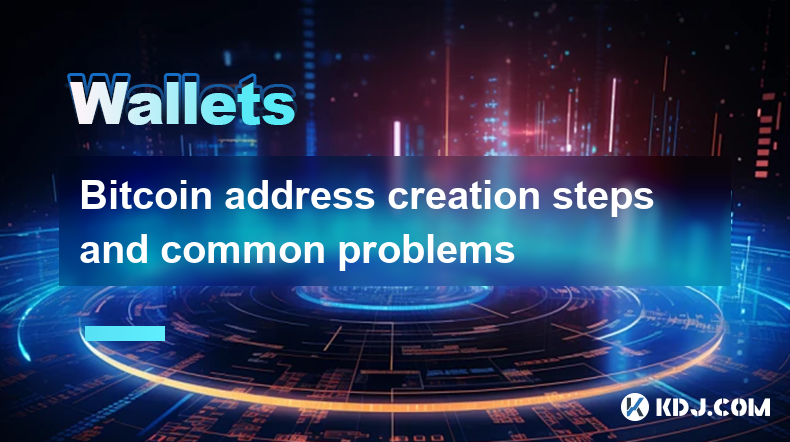
Bitcoin address creation steps and common problems
Mar 30,2025 at 06:07am
Understanding Bitcoin AddressesA Bitcoin address is a unique identifier, similar to a bank account number, used to receive Bitcoin. It's a string of alphanumeric characters generated from a public key, derived from your private key. Understanding the distinction between public and private keys is crucial for Bitcoin security. Your private key should be...
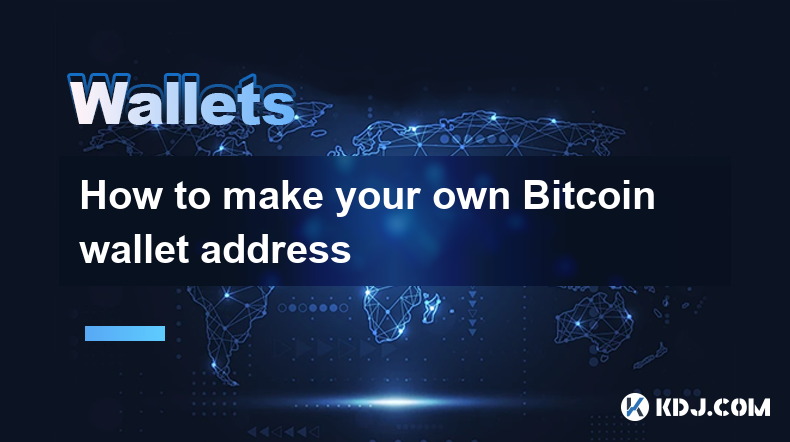
How to make your own Bitcoin wallet address
Mar 29,2025 at 08:42pm
Creating your own Bitcoin wallet address is crucial for securing and managing your Bitcoin holdings. It allows you to independently receive and send Bitcoin without relying on third-party services. This process involves understanding the different types of wallets and choosing the one that best suits your needs and technical expertise. Incorrectly gene...
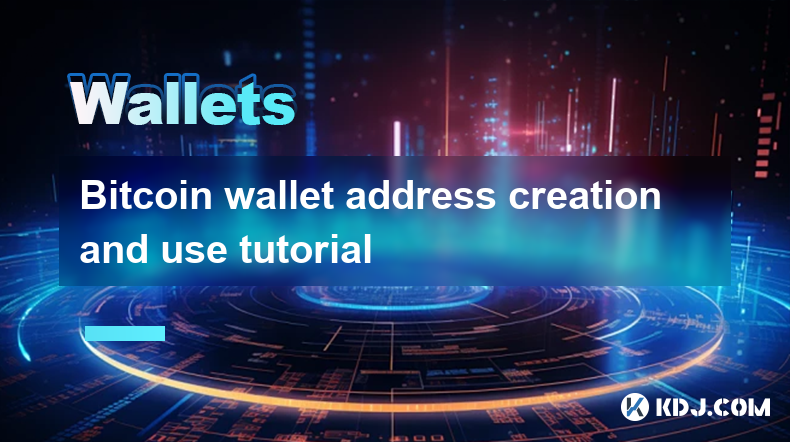
Bitcoin wallet address creation and use tutorial
Mar 29,2025 at 10:14pm
Understanding Bitcoin Wallet AddressesA Bitcoin wallet doesn't store Bitcoin in the way a traditional bank account does. Instead, it stores private keys, which are cryptographic secrets allowing you to access and spend your Bitcoin. Your Bitcoin address, on the other hand, is a public identifier, like an email address, that others can use to send you B...

Bitcoin address generation and secure storage guide
Mar 30,2025 at 08:07am
Understanding Bitcoin AddressesA Bitcoin address is essentially your public key, a string of alphanumeric characters used to receive Bitcoin. It's analogous to your bank account number. Unlike your private key, which is crucial for spending your Bitcoin, your address can be shared publicly without compromising your funds. Generating a new address is sim...
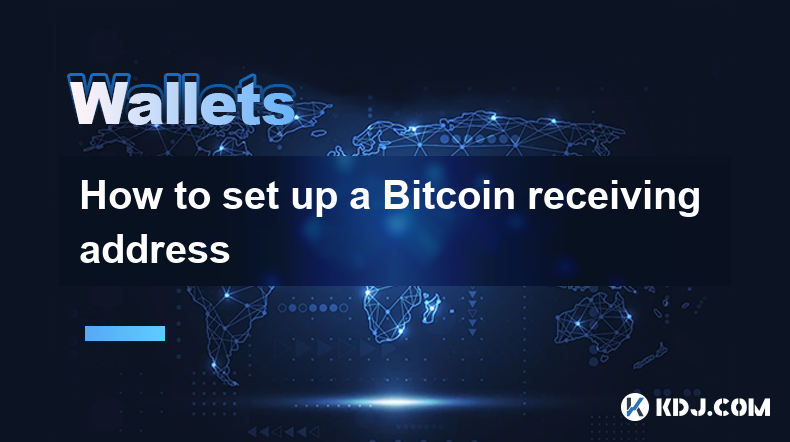
How to set up a Bitcoin receiving address
Mar 30,2025 at 06:14pm
Understanding Bitcoin Receiving AddressesA Bitcoin receiving address is essentially your unique identifier on the Bitcoin network. It's a string of alphanumeric characters that allows others to send Bitcoin to you. Think of it like your bank account number, but specifically for Bitcoin. You need a receiving address to receive Bitcoin. Crucially, you ca...

How to easily generate a Bitcoin payment address
Mar 29,2025 at 10:49am
Generating a Bitcoin payment address might seem daunting, but it's actually quite straightforward. This process is crucial for receiving Bitcoin, as each transaction requires a unique address. Understanding how this works is fundamental to using Bitcoin effectively. This guide will walk you through the simple steps, regardless of your technical experti...

Bitcoin address creation steps and common problems
Mar 30,2025 at 06:07am
Understanding Bitcoin AddressesA Bitcoin address is a unique identifier, similar to a bank account number, used to receive Bitcoin. It's a string of alphanumeric characters generated from a public key, derived from your private key. Understanding the distinction between public and private keys is crucial for Bitcoin security. Your private key should be...

How to make your own Bitcoin wallet address
Mar 29,2025 at 08:42pm
Creating your own Bitcoin wallet address is crucial for securing and managing your Bitcoin holdings. It allows you to independently receive and send Bitcoin without relying on third-party services. This process involves understanding the different types of wallets and choosing the one that best suits your needs and technical expertise. Incorrectly gene...

Bitcoin wallet address creation and use tutorial
Mar 29,2025 at 10:14pm
Understanding Bitcoin Wallet AddressesA Bitcoin wallet doesn't store Bitcoin in the way a traditional bank account does. Instead, it stores private keys, which are cryptographic secrets allowing you to access and spend your Bitcoin. Your Bitcoin address, on the other hand, is a public identifier, like an email address, that others can use to send you B...

Bitcoin address generation and secure storage guide
Mar 30,2025 at 08:07am
Understanding Bitcoin AddressesA Bitcoin address is essentially your public key, a string of alphanumeric characters used to receive Bitcoin. It's analogous to your bank account number. Unlike your private key, which is crucial for spending your Bitcoin, your address can be shared publicly without compromising your funds. Generating a new address is sim...

How to set up a Bitcoin receiving address
Mar 30,2025 at 06:14pm
Understanding Bitcoin Receiving AddressesA Bitcoin receiving address is essentially your unique identifier on the Bitcoin network. It's a string of alphanumeric characters that allows others to send Bitcoin to you. Think of it like your bank account number, but specifically for Bitcoin. You need a receiving address to receive Bitcoin. Crucially, you ca...
See all articles






















































































